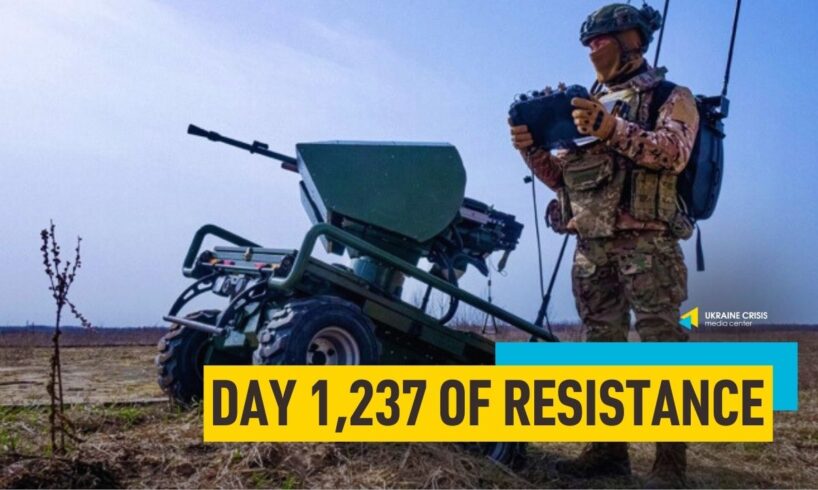
Ukraine’s defense intelligence expands the use of ground robots in combat operations. Zelenskyi and Kellogg discuss air defenses and arms purchases in Kyiv. Slovakia, Malta block the 18th sanctions package on Russia.
Ukraine’s defense intelligence expands the use of ground robots in combat operations
The Main Intelligence Department of Ukraine’s Defense Ministry is expanding the use of unmanned ground vehicles in combat operations, the agency said in a statement on Monday.
It released the footage showing the use of the Lyut ground robot by its units on the frontlines in Sumy region. It also put out intercepted Russian communications capturing the Russians’ reactions to being attacked by the ground drone.
The unmanned ground vehicle is equipped with a machine gun. It can move through difficult terrain, including areas with fallen trees and explosion craters, Ukraine’s defense intelligence said, adding that the ground robot demonstrates a stable connection along the way and sends imagery to the command post.
Once it gets to enemy positions, it takes out Russian forces with dense machine gun fire, the statement reads.
This fire suppression point opens the way for other units and weapons involved in the operation to maneuver, the military intelligence said.
Vidéo :
Zelenskyi and Kellogg discuss air defenses, arms purchases in Kyiv
Ukrainian President Volodymyr Zelenskyi met Monday with U.S. President Donald Trump’s special envoy for Ukraine and Russia, Retired Lieutenant General Keith Kellogg.
Zelenskyi in a post to X said they had a “productive conversation.”
“We discussed the path to peace and what we can practically do together to bring it closer,” Zelenskyi wrote. “This includes strengthening Ukraine’s air defense, joint production, and procurement of defense weapons in collaboration with Europe. And of course, sanctions against Russia and those who help it.”
“We hope for U.S. leadership, as it is clear that Moscow will not stop unless its unreasonable ambitions are curbed through strength,” the Ukrainian leader added. “I thank Keith Kellogg for this visit to Ukraine. I am grateful to President Trump for the important signals of support and the positive decisions for both our countries.”
Kellogg is on a visit to Ukraine beginning on Monday, July 14. His last visited the country on February 19.
U.S. President Donald Trump said last week he was considering additional sanctions on Russia, underscoring his frustration with Russian leader Vladimir Putin. “We get a lot of bullshit thrown at us by Putin. (…) He’s very nice all the time, but it turns out to be meaningless,” Trump said.
U.S. Senator Lindsey Graham said on Sunday he expects in the coming days “you will see weapons flowing at a record level to help Ukraine defend themselves,” along with new sanctions. He explained that the sanctions package would give the president the ability to impose tariffs on any country that helps Russia.
Trump said on Sunday he will send Patriot air defense missiles to Ukraine. He did not give a number of Patriots he plans to send to Ukraine, but he said the United States would be reimbursed for their cost by the European Union, according to Reuters.
Slovakia, Malta block 18th sanctions package on Russia
Slovakia and Malta are blocking the EU’s plan for an 18th sanctions package against Russia, Ukrainian news site European Pravda said on Monday, citing several EU diplomats familiar with the matter.
One of the sources said ambassadors to the EU discussed on Sunday the 18 package of sanctions for several hours at a meeting of Coreper, the Committee of the Permanent Representatives of the Governments of the Member States. Slovakia continues to block a new EU sanctions package against Russia until it first reaches a deal with the European Commission to cushion the effect of a proposed ban on Russian gas imports from 2028.
Malta is opposed to lowering the price cap on Russian oil sales. “Another diplomat said that Malta, like Greece and Cyprus, is a country with a large tanker fleet, and its economy relies on oil transportation. That is why these countries did not support the idea of lowering the price ceiling on Russian oil. Only Malta insisted on rejecting the proposal at the meeting of EU ambassadors on Sunday,” European Pravda said.
The European Commission has proposed a floating price cap on Russian oil of 15 per cent below the average market price of crude in the previous three months, according to Reuters. European Union envoys are on the verge of agreeing an 18th package of sanctions against Russia that would include a lower price cap on Russian oil, four EU sources said after a Sunday meeting.





